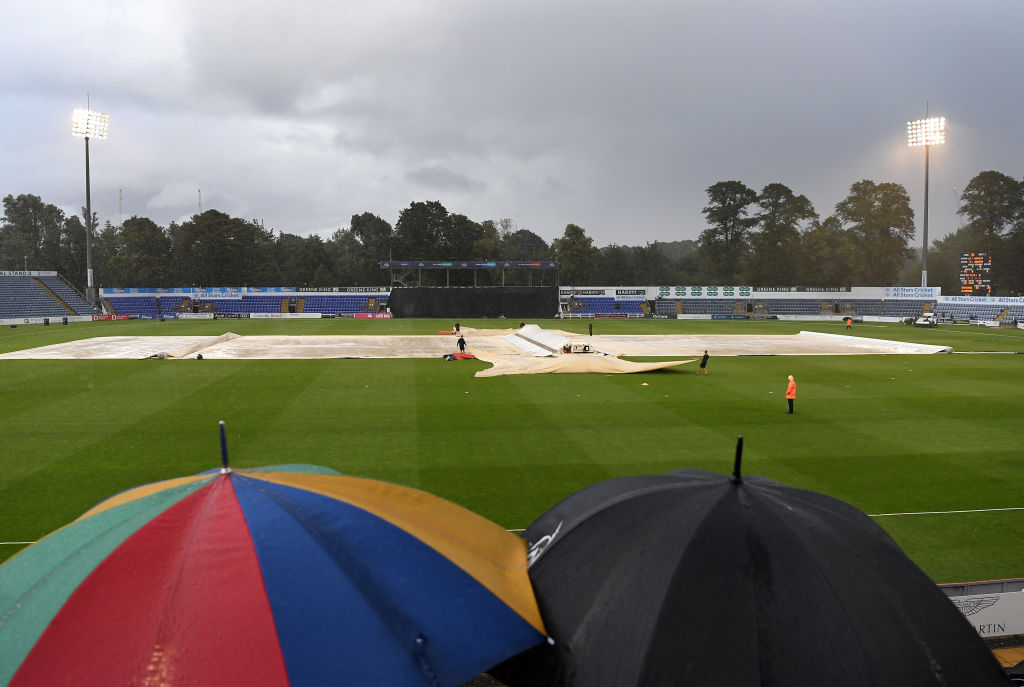Rain, rain, and more rain - whose loss is it anyway?

The first T20I between India and South Africa has been washed out due to persistent downpour in Dharamsala and that means both the teams will now have to travel to neighbouring Mohali for the second T20I on September 18. The preparation has been delayed, so did much more of incurring revenue.
Sitting with the backdrop of Himalayas, showers in September might as well conjure romantic images of autumn, but when you're faced with the prospect of losing the first home game of the season - that too on a Sunday evening - you could be forgiven for cursing the clouds that hung like heavy magnets over the Dharamsala sky.
It was as if Dharamsala, surrounded by cedar forests on the edge of the gigantic Himalayas, was waiting for the arrival of the teams, and help them forget the languid days of shimmering heat and dusty grass. It was cricket that was supposed to take precedence but as it turned out, people will have to wait for three more days before they see Rohit Sharma and Virat Kohli whacking the South African bowlers all around, with Byju’s written all over their jersey. There will be no memories of Dharamsala and Mohali will take over.
Whose loss was it anyway? This was going to be the start of a long T20I season ahead of the 2020 ICC T20 World Cup and a game against South Africa would have the ideal start for what could be considered as India’s biggest chance to reclaim the throne that they had first won 12 years ago. They have two more chances this series but a game in Dharamsala poses a challenge of a different kind - considering the climatic conditions help batsmen and bowlers in equal amounts.
More than anything else, this was also an opportunity for India to settle with an opening combination in the wake of Shikhar Dhawan’s regular under-performance in the format. Rohit Sharma is the only certainty to open in the World T20 next year, and India would have wanted to send Rahul up top to ensure that the experimentation started right on time. As in Hindu Epic Ramayana, Valmiki wrote about Ravana teaching Lakshman, “Shubhasya Shighram”, the Indian team management would have loved to start their preparation at the earliest possible moment.
For South Africa too, this holds equal significance, if not more. Straight from a disappointing World Cup campaign, where they ended below Sri Lanka, the team has a mountain to climb in order to structure them better for future challenges. The team, led by Quinton de Kock, have only three players - David Miller and Kagiso Rabada, and de Kock himself - from their last trip to India and there are as many as four debutants in the squad. The first game gave them a chance to get into the groove before they have a clarity of mind in Mohali and Bengaluru game. Now they have been devoid of that too.
Rishabh Pant had an opportunity to get the crack of first Dhoni-less India at home as a full-time wicket-keeper and build on his performance in the Windies series. The storylines were there to be tapped and the rain god delayed it and took one chance away from the Delhi southpaw. If anything, the rain in Dharamsala took away the very essence of what could have been a classic start to the winter, after a chain of ODI matches and the heavy dose of Tests through Ashes and India-Windies Test series.
An uncluttered mind to come and enjoy a game of T20 cricket in India is never a bad proposition and is something that energises the Indian fans like nothing else. Now, as things stand, the game has been abandoned and fans have been devoid of some fun. All said and done, this is not a piece to rant about the climatic conditions affecting cricket. It is given anyway, and the sport will continue to be affected by it irrespective of what scientific discoveries can be done to protect the very basics of it.
One could do nothing about nature’s fury than sit and contemplate, frustrate himself with the intricacies of the sport that is fundamental to its existence. But for a day like today, the ideal way of approaching it was by making yourself adaptable to it and accepting it as a part and parcel of the game.
The washout in Dharamsala hurts but it hurt cricket even more. What if Shreyas Iyer would have scored a 55-ball century after an initial top-order collapse? What if Temba Bavuma, almost a veteran in the South African Test team, but was about to make his T20 debut today, hit Indian spinners out of the park? We would never know that. So the best is to wait for the second T20I and indulge in the revelry in the same way as we would have done today.
